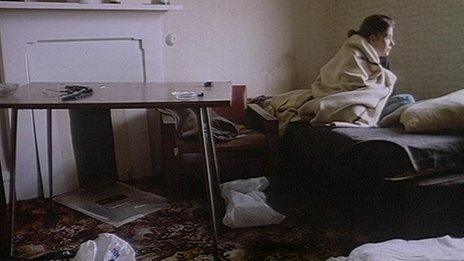Scheme to help homeless in Glasgow is hailed as a success
- Published
The project housed homeless people across a number of properties in Glasgow
A scheme to help the homeless is being hailed a success after being piloted in Glasgow.
The "Housing First" project allocates rented flats to homeless addicts and alcoholics, without insisting they go through rehabilitation first.
It aims to give them support to live independently and recover from their addictions.
The Glasgow pilot is part of a larger European scheme being carried out across 10 countries.
The new support model is based on the theory that people are better positioned to recover from addiction if they are provided with the security of their own home, along with adequate support.
The project involved 22 people who were sleeping rough, on friends' sofas or living in hostels. Twenty had criminal records.
They were given a limited choice over where they'd like to live, alongside ordinary tenants in six housing associations in Glasgow.
'Good neighbours'
"It's very important that we support people in normal housing stock," said Martin Cawley, the chief executive of Turning Point, the social enterprise which co-ordinated the project.
"People learn to become good neighbours and learn the responsibilities of holding a tenancy."
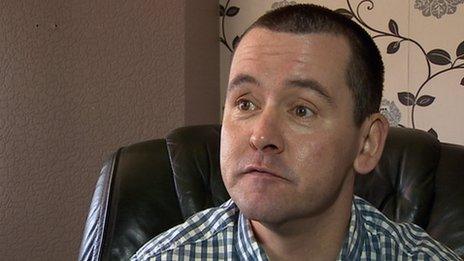
Scott Campbell said he "feels great" since getting a flat
Once participants moved into a flat, they were given intensive support by a team of six full-time staff, half of whom had experience of addiction themselves.
The staff aimed to "stick with" participants even if they failed to turn up for appointments or respond to phone calls.
Participants were also supported to keep their tenancy agreements if they spent time in prison, hospital or rehabilitation.
Independent analysis by Heriot Watt University showed that no-one was evicted from their flat and the majority of participants retained their tenancies.
Criminal activity reduced, although there was little change in overall alcohol dependency. There were few neighbourhood disturbances involving the participants.
"Almost 90% sustained their tenancy over three years," said Mr Cawley. "That's fantastic results for people often caught up in cycle of homelessness and very difficult to reach...people who didn't engage very well with services."
'Sustained improvements'
One of those who turned his life around after joining the scheme is Scott Campbell. He would drink alcohol until he passed out on a daily basis until he was allocated a one-bedroom flat in the south-west of the city.
Since moving into the flat he has re-decorated, reduced his alcohol dependency and paid the bills for two years.
"What I've done with my house makes me so proud," said Scott. "It makes me feel better. In the past I've been in houses where I've had nothing. That can make you feel down and knock you back the way."
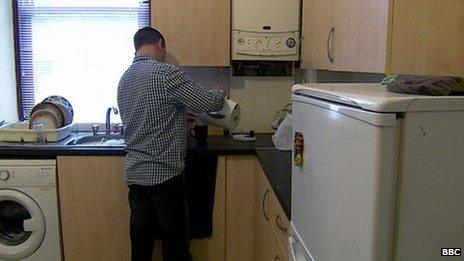
Over 90% of the people on the scheme maintained their tenancy agreements
"Now I feel great. This is my home. I can come in when I want and do what I want. I can get away from the outside world and relax."
He added: "Housing First has supported me through a lot. They've helped me to retain my tenancy. They've been there when I've been down."
However, while half of those involved reported positive and sustained improvements in their lives, a quarter had fluctuating experiences and relapses, and in the remaining quarter there was little evidence of change with drug and alcohol use at similar levels as before.
Despite this, researchers noted that even this group of addicts were reported to be more receptive to support than before.
The Glasgow project is the first in the UK to adopt a US-style "Housing First" approach and is being monitored as part of a European Commission pilot across 10 countries.
- Published2 April 2014
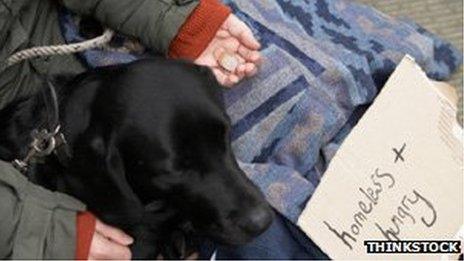
- Published23 December 2013
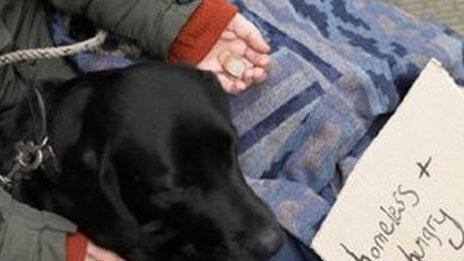
- Published19 November 2013
